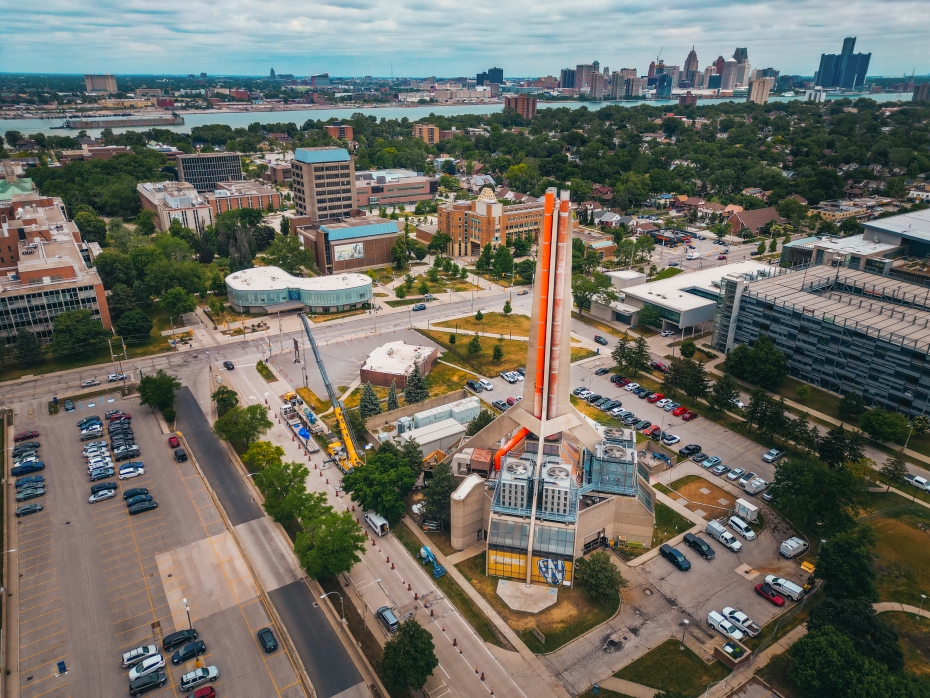 The new York YST chiller is hoisted by a crane into the University of Windsor's Energy Conversion Centre. The new chiller is expected to reduce the equivalent of 8,300 tonnes of carbon dioxide annually. (Photo by University of Windsor)
The new York YST chiller is hoisted by a crane into the University of Windsor's Energy Conversion Centre. The new chiller is expected to reduce the equivalent of 8,300 tonnes of carbon dioxide annually. (Photo by University of Windsor)
WINDSOR, Ont. — The University of Windsor reaffirmed its commitment to fostering a culture of environmental sustainability on campus and beyond with the installation of a new dual drive, electric-steam turbine chiller — the first of its kind at a Canadian university.
The innovative chiller, driving the heating/cooling and ventilation systems of more than 29 buildings across campus, was unveiled Wednesday alongside University leadership, students, staff and Enbridge Gas representatives. The installation project denotes one of the largest sustainability initiatives UWindsor has undertaken this year and is part of an ambitious plan to reduce greenhouse gas (GHG) emissions by 45 per cent in seven years and net zero by 2050.
"This milestone project marks our unwavering dedication to environmental stewardship and energy efficiency," said Gillian Heisz, University of Windsor’s vice-president, Finance and Operations. "It not only supports our sustainability objectives but also hopefully inspires others to embrace similar measures."
Nadia Harduar, the University’s sustainability officer, added: “This fall, we are thrilled to unveil our Campus Carbon Neutral Master Plan, a comprehensive roadmap that outlines our bold strategy to further reduce emissions and create a more sustainable campus for generations to come. This plan works to address one of the priorities outlined in the University’s overall strategic plan released in the summer.”
Located within the Energy Conversion Centre (ECC) on Patricia Street, the York YST chiller uses energy-efficient electricity, complemented by alternative steam energy. By seamlessly combining these two energy sources, the advanced hybrid technology will reduce the equivalent of 8,300 tonnes of carbon dioxide (CO2) emissions each year by minimizing natural gas usage and saving an estimated annual operating budget of over $1 million. The reduction in CO2 emissions is equivalent to removing 2,000 cars off the roads in a single year. The GHG emission reduction by installing this new hybrid chiller is anticipated to achieve 82 per cent of UWindsor’s 2030 GHG emission reduction target.

Representatives from Enbridge Gas were also on hand to celebrate the chiller installation and present incentives of $200,000 as part of UWindsor’s participation in their Commercial Energy Efficiency program in support of companies meeting their sustainability goals. Including today’s incentive, UWindsor has received more than $438,400 from Enbridge Gas since 2018 by reducing reliance on natural gas through energy-efficient equipment upgrades, installation of demand-control ventilation systems and more. The new chiller will contribute to dramatically increasing energy savings and reducing emissions.
Sarah Van Der Paelt, director of marketing and energy conservation for Enbridge Gas, said the company is proud to work closely with clients like UWindsor to maximize efficiencies.
“Through a combination of innovation, collaboration, and conservation efforts, we have created a successful strategy to reduce emissions while embracing a clean energy future,” Van Der Paelt said.
Heisz agreed and said achieving our goal will require every member of our campus community to look at opportunities for efficiencies big and small.
“As a community of change-makers, the University is prepared to take bold steps to shape a more sustainable and environmentally responsible future,” she said.
To learn more about the University of Windsor’s campus initiatives, please visit uwindsor.ca/sustainability.
